SCORPIO
R3bn ‘fraudulent, intentional tax evasion’: An in-depth account of how Sars busted tobacco & gold plunder network

The South African Revenue Service says it has caught buccaneer capitalist Simon Rudland and his associates managing a transnational plunder network that involves billions in illicit tobacco and gold cash, a vast money laundering racket and the corrupting of five Sasfin bank officials enlisted to sneak at least R3-billion to foreign countries and delete banking transactions.
The South African Revenue Service (Sars) on Friday, 25 August, took charge of bank accounts, premises and all other assets owned by cigarette manufacturer Gold Leaf Tobacco Corporation (GLTC) and of its directors Simon Rudland and Ebrahim Adamjee.
This, after Sars was granted an ex parte preservation order in the High Court in Pretoria in which a curator was appointed to look after the affairs of GLTC, Rudland and Adamjee.
Sars approached the court in secret and accused GLTC, Rudland and Adamjee of “fraudulent, intentional tax evasion” and being “obstructive”.
Based on what seems to be a multiyear probe, ace investigators said the accused did not declare more than R2.5-billion in income from illicit cigarettes for the years 2017/18, nor VAT of more than R356-million from September 2016 to July 2017.
To hide the crimes, the plunder network allegedly managed a cross-border money-laundering racket that leaned on bribed Sasfin banking officials to sneak more than R3-billion in undeclared money mainly to Dubai, camouflage their footprints by deleting banking transactions, expedite payments, craft fake documentation and delete forex movement reports to the Reserve Bank.
Sasfin COO Rodger Dunn in March admitted to Sars that the bank’s own belated investigation “evidences deletion of transactions”. In an astonishing letter annexed to a Sars court application dated 31 March 2022, Dunn admitted the bank statements for GLTC had to be reconstructed. By the time Dunn wrote this letter, Sasfin had not salvaged all the information.
When Scorpio phoned Dunn, he insisted on following protocol, which does not involve him speaking to journalists.
Sasfin CEO Michael Sassoon was at pains to say “we are 100% cooperating with Sars” and that all subpoenaed documents had been handed over.
From the court documents, it is not clear whether Sasfin managed to retrieve all the deleted information.
Sassoon said: “I think we have given everything to Sars that was needed.”
Four out of five banking officials accused by Sars of manipulating and deleting bank processes and statements have left the bank, Sassoon confirmed. (Scorpio will return to Sasfin and its banking officials in the third story of this series.)
The taxman’s clawback
Simon Rudland, a member of the controversial Rudland family of Zimbabwe described as “Mnangagwa’s oligarchs”, seems to be highlighted as one of the key figures in the plunder network.
Rudland “initiated and established the protocols in relation to the remittance of funds to foreign jurisdictions” and “was directly involved in issuing instructions on behalf of GLTC … regarding how these illicit funds had to be dealt with”, Sars investigators found.
He negotiated fees with the network’s money launderer and “mr. Rudland was at all times aware of the deposits … in the GLTC Sasfin bank accounts and the remittance of funds to foreign jurisdictions. Mr Rudland took steps to circumvent the detection of these deposits and payments from the relevant authorities, including Sars.”
New report makes further claims about Harare’s corrupt elites and their South African connections
Now Sars wants an additional R1-billion in undeclared income tax and VAT from GLTC for tax years 2017 and 2018 and VAT period of September 2016 to July 2017, respectively.
Investigators told the court they had “reason to believe that GLTC, assisted by Mr Adamjee and Mr Rudland, is still involved in illicit money laundering and continues to dissipate its assets”.
“It is evident that GLTC would not hesitate to make use of any means at its disposal to frustrate the collection of tax.”
Therefore, Sars said in its court papers, investigators have reopened probes into other tax years.
Due to “fraud, misrepresentation and non-disclosure of material facts”, GLTC’s tax bill may rack up to R3-billion once understatement penalties and interest are added.
And because GLTC’s local assets are inadequate to pay its tax debt, Sars asked the court to allow the revenue service to grab Rudland and Adamjee’s assets as well.
To convince the judge, Sars further revealed that in April this year it received another ex parte order to convene a tax inquiry in terms of Section 50(1) of the Tax Administration Act.
Tax inquiries are traditionally highly secretive affairs and somewhat draconian, usually compelling taxpayers to reveal all. The public is rarely informed about information from these proceedings, or even that they are happening.
Rudland, being one of the respondents, has been fighting like a tiger in this tax inquiry to keep eyes off his international assets and money flows, Sars revealed. The newly appointed curator will now start investigating Rudland’s international assets at the same time as Rudland fights in court to block any such revelations.
Investigators reveal that, for years, Rudland’s plunder network allegedly mainly worked to sneak billions of undeclared rands out of the country – in effect impoverishing South Africa.
The second goal was born from necessity, Sars said: to hide the massive cash problem created by the sale of illicit cigarettes.
Measured in cash received per year, GLTC’s illicit business seemed to have eclipsed its legitimate annual earnings.
GLTC’s annual financial statements show, for example, that its legitimate declared business earned R1,5-billion and R1,8-billion in revenue for 2017 and 2018 respectively. The illicit arm of GLTC’s business, investigators found, received just more than R3-billion in illicit cigarette cash during the 16 months from August 2016 to November 2017.
There is a very real risk, investigators argued, that Rudland and Adamjee would try to spirit away their assets if they were to know the depth and breadth of the trouble they were in. Hence the secret ex parte court application.
Judge AJ Strijdom in the High Court of Pretoria agreed and signed the order on Wednesday, 24 August. GLTC, Rudland and Adamjee have until early November to convince the court that Sars is wrong.
The defence: Play dead
Rudland and Adamjee told the tax inquiry they had done nothing wrong and had declared all GLTC’s taxes to Sars.
GLTC deposited only a total of R162,7-million into its Sasfin accounts between 2016 and 2017, they say, and “any amount beyond this was not GLTC’s money”.
Where there is more money flowing into GLTC than what was declared, they claim to know nothing about it.
Where there was manipulation of its Sasfin bank account, Rudland and Adamjee were “not a party to it and it was not aware thereof”.
In fact, they argue GLTC’s accounts have been “hijacked” by Mohammed Khan from SALT Asset Management, appointed as GLTC’s intermediary with Sasfin.
Khan, Adamjee would have Sars know, went on his own frolic, corrupted Sasfin officials and abused his access to GLTC’s accounts for his sole benefit.
In Sars’s version, Khan seems to be a key money launderer who managed GLTC’s relationship with Sasfin.
In late 2020, Sars slapped Khan and 30 other people and companies with a similar ex parte application.
Reading Khan’s WhatsApp conversations with Rudland and his confidantes convinced investigators there was more to be uncovered.
In May this year, GLTC gave Sars a pile of documents that included a schedule of “authorised payments” — just to prove that it kept a book of “legitimate transactions” and that it knew nothing of the R3-billion washing through its accounts.
It didn’t work out well, Sars investigators told the court: “Sars analysed the records and identified various discrepancies concerning the ‘authorised payments’ made by GLTC in relation to certain of its suppliers.”
The “proof” lacked supporting source documentation, quantities of tobacco recorded in the documentation did not match the customs amounts and weights declared to Sars and, in other instances, Sars could not find records of the payments allegedly made to suppliers.
Apart from the actual numbers not making sense, a gaping hole in GLTC’s defence is this:
If we accept their version that Khan “hijacked” GLTC’s accounts and that Rudland and Adamjee knew nothing about the R3-billion moved through their accounts, mainly to Dubai, one would not expect the “hijacked” payments to flow to one of Rudland’s close business partners.
Yet, Sars says evidence suggests that more than R2.2-billion – the bulk of the R3-billion loot – flowed to a Dubai-based company named Aulion Global Trading DMCC, whose sole director is Rudland’s friend and business partner, Howard Baker. The same Baker who Sars now says has “for all intents and purposes disappeared”.
Rudland, Baker and lawyer Raees Saint have been the focus of long-term suspicion, as detailed here by amaBhungane.
The Rudlands consistently make the news as members of the powerful political and economic elite in Zimbabwe, propping up Zanu-PF.
Their moves to grab hold of sugar multinational Tongaat Hulett this year again thrust them into the spotlight. What seems to have been an uneasy relationship with the truth, in the end, kneecapped the family’s Tongaat Hulett deal, although this seems to be everyone’s fault but their own, as described here by Financial Mail’s Rob Rose.
How it all fits together: mechanics of the plunder network
Based on public information and the current set of court documents, it seems as if Sars’s ace investigators have been quietly dismantling GLTC’s transnational plunder network since at least 2020. Investigators have probed and clawed back staggering amounts of taxes from tobacco smugglers, money launderers, bankers, cash-in-transit companies, gold dealers, clearing agents and refineries.
GLTC is one line of inquiry in Sars’s and Sarb’s broad illicit tobacco, gold, tax evasion and forex transgression investigations, Sars commissioner Edward Kieswetter said in a media release on Friday, 26 August, announcing the successful preservation order.
Several key role players, including money launderer Mohammed Khan, Rudland’s business partner Howard Baker and cash-in-transit company owners Kalandra Viljoen of AMFS and Christo Janse van Rensburg of Rens Kontant in Transito, have had their assets frozen and forfeited to the state.
Others, such as Sasfin bank, woke up with Sars officials trawling through their confidential documents, bank statements and officials’ private conversations on the back of search-and-seizure orders.
With each step, Sars built the puzzle of how the illicit tobacco, gold and cash enterprises operate in mutual symbiosis, investigators said in court documents.
Sars pieced together that GLTC has, on the one hand, a legal business generating revenue of about R2-billion every year. On the other, GLTC operates an off-book enterprise based on manufacturing and selling illicit tobacco that eclipse the earnings of its legal business.
“No or insufficient taxes are therefore paid on the income generated from these illegal activities,” investigators told the court.
In proving their case, Sars investigators seem to have relied a great deal on WhatsApp conversations between Rudland, Khan, two Sasfin employees and the managers of a cash-in-transit company. Some excerpts were included as annexures.
The Rudland plunder network, as sketched by Sars, had four goals: To make tonnes of illicit money, to wash it until it seemed legit, to shield it from the authorities’ scrutiny and to move it out of the country.
To pull it off, the scheme had four elements. Three will be discussed underneath, and the fourth — which details Rudland’s fingerprints on the very first deleted Sasfin payment — will be explained in the second story of this series.
1. Illegal earnings, fake documents and cash-in-transit companies
GLTC regularly imported raw tobacco from international logistics companies to manufacture cigarettes. On the illicit side of things, no excise duties were paid and sometimes documentation was faked to mask the importation.
“Sars is not aware of exactly how and where these illicit cigarettes are being manufactured,” investigators conceded.
In other instances, documentation was faked to make it seem as if tobacco was bought, but no goods actually moved from point A to point B. In a crafty manoeuvre, it was a ruse created to move money.
All of the above were illegal earnings. They generated a massive cash turnover, which was utterly useless if it was not introduced into the banking system.
GLTC “is obviously faced with a considerable cash problem as the cash cannot be deposited into GLTC’s normal bank accounts without raising suspicion and it being detected by Sars”, investigators explained.
GLTC resolved this cash problem by using cash-in-transit companies to act as an unregistered banking facility, which unscrupulously assisted in laundering the cash. (GLTC used these companies in the legal part of their business too, Sars conceded.)
Cash-in-transit companies would collect the cash from a number of GLTC businesses and warehouses across the country, as well as several addresses in Lenasia.
Alarmingly, Sars records at least one instance where pilots landed at Lanseria International Airport in Gauteng with bags of cash handed over to the cash-in-transit drivers at the Execujet premises. These cash-in-transit drivers had colourful names, such as “Goofy”, “Snoop” and “Chubby”.
To “wash” illicit cash, it had to be integrated into the formal banking system. This happened in two ways, Sars found:
- These cash-in-transit companies would pay the hundreds of millions of rand in collected cash into their own bank accounts, pretending that it was their own money.
- The second method involved “selling” the cash to other cash-focused industries, such as gold smelters and traders. These gold companies would then EFT money back to the cash-in-transit companies. Gold Kid Trading in Springs, Gauteng — with Howard Baker as former director and Andries Greyvenstein as current director — was a key company in this part of the scam. (Gold Kid Trading, Baker and Greyvenstein are all respondents in Sars’s tax inquiry.)
Using both methods, digital money ended up in cash-in-transit companies’ bank accounts. The cash was placed into the formal banking system and mixed with other, legitimate funds.
The crucial part: No one could trace the origin back to GLTC’s illicit cash sales. The money was washed.
2. Placement in the formal banking system: From AMFS to Sasfin
The cash-in-transit company mainly used in this particular scheme, Sars found, was former model Kalandra Viljoen’s business, Asset Movement Financial Service (AMFS).
(In 2019 Viljoen faltered under sharp cross-examination from Adv Kate Hofmeyr during State Capture Commission hearings that showed AMFS was laundering millions of rand in stolen government money.)
Publicly available evidence suggests AMFS was a professional launderer for more than just the Rudland plunder network.
In this case, AMFS levied a fee of 0.3% to 0.5% of the money collected for its client, Sars told the court.
3. Layer and mix the funds
Between August 2016 and November 2017, AMFS and AMFS Solutions sent more than R3-billion in about 180 transactions to GLTC’s bank accounts, mainly held at commercial bank Sasfin.
It seems that only one payment — R2 989 979 on 7 September 2016 — detoured through Absa before this, too, made it to GLTC’s Sasfin bank account.
Based on WhatsApp discussions, Sars identified Baker as the person who predominantly instructed AMFS on the amounts of payments and to which bank accounts these payments were to be sent.
Said Sars investigators: “The cash was thereby effectively formally introduced into the banking system and was laundered under the guise and pretences of legitimate business transactions. The fact remains, however, that no taxes were paid on this turnover.”
And another layer: Poof! It’s all gone…
A good money-laundering scheme attempts to mix illicit funds with legal money, break up the payments multiple times and repeatedly send it through different paths before it all ends up at its intended goal. That is to hamper any investigation.
It is, however, widely accepted — taken for granted, even — that the paper trail of money movement will always be there to find. The banking system records everything and an investigator just needs the correct information, some street smarts and sometimes a little luck to successfully crack any money-laundering scheme.
Until now.
According to Sars, a chunk of the payments sent from AMFS and AMFS Solutions to GLTC Sasfin’s bank account were deleted. And so were the outgoing payments to foreign jurisdictions. This is depicted in the graph above: money was moved from AMFS to GLTC’s Sasfin accounts, and then deleted. The same was done to money moved to foreign companies. This made any investigation incredibly difficult.
R3-billion: Sars swoops on Gold Leaf Tobacco over transnational plunder network
To disguise the transactions and to avoid scrutiny from the Reserve Bank, the Balance of Payment Customer reports were also removed. These are generated and reported daily.
Khan communicated these instructions to the Sasfin officials, who moved the illicit cigarette money from Sasfin’s accounts offshore on the back of fictitious invoices and customs documents, or sometimes no documents at all.
It seems that, at a conservative estimation, at least 180 banking transactions were ultimately deleted. (Sars’s founding affidavit in the preservation application did not quantify the number of transactions deleted, but based on documents and reconstructed bank statements annexed to the papers, Scorpio could count the number of payments deleted. The true number may well be still higher than the mentioned figure.)
Add another layer: SALT Asset Management
Washing money is a specialised business with many moving parts.
Mohammed Khan, a former bean counter at Edcon, is described by investigators as “the financial broker who facilitated the illicit transfers and was the interface between GLTC and the Sasfin employees”.
In effect, he laundered the money paid from AMFS into GLTC’s bank accounts and devised plans to move it out of South Africa.
Of the more than R3-billion that was washed through GLTC’s accounts, more than R2-billion ended up in the Dubai-based company, Aulion Global Trading DMCC, linked to Baker, and another sizeable chunk was sent to Valmont Valley in Switzerland.
GLTC formalised the relationship by contracting Khan’s company SALT Asset Management to act as an intermediary with Sasfin. The contract, attached to Sars’s papers, ironically forbids any dodgy behaviour.
Most transactions between GLTC and Sasfin were facilitated through SALT.
“Sars believes this was by design to create distance between GLTC and the illegal transfers abroad of the cash generated by the sale of the illicit cigarettes,” investigators said.
SALT was paid a commission for its business. Supported by a series of WhatsApp messages between Rudland and Khan, investigators told the court that “the commission earned was an amount negotiated with Mr Rudland and was agreed to be 3%” for every R1-million sneaked abroad.
The annexed messages show Khan on 6 September 2016 asking for “40k per bar”.
Rudland replied: “4% to high” (sic).
“Ok let met check with guys”, Khan told Rudland, and came back with “3% they not budging” (sic).
Rudland seemed to have agreed: “Ok send me bank details pls” (sic).
Read the next article in this series which follows the details around the very first payment, in what seems to have been the litmus test for later payments that washed through Sasfin.

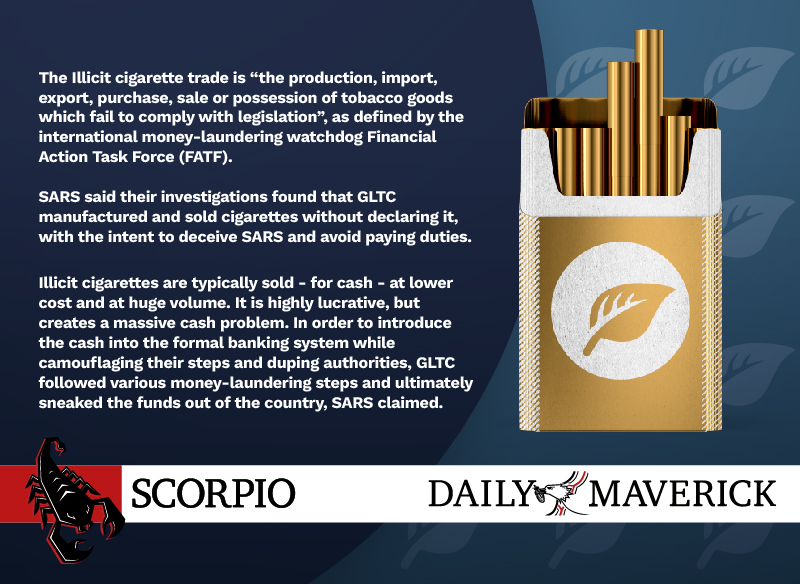
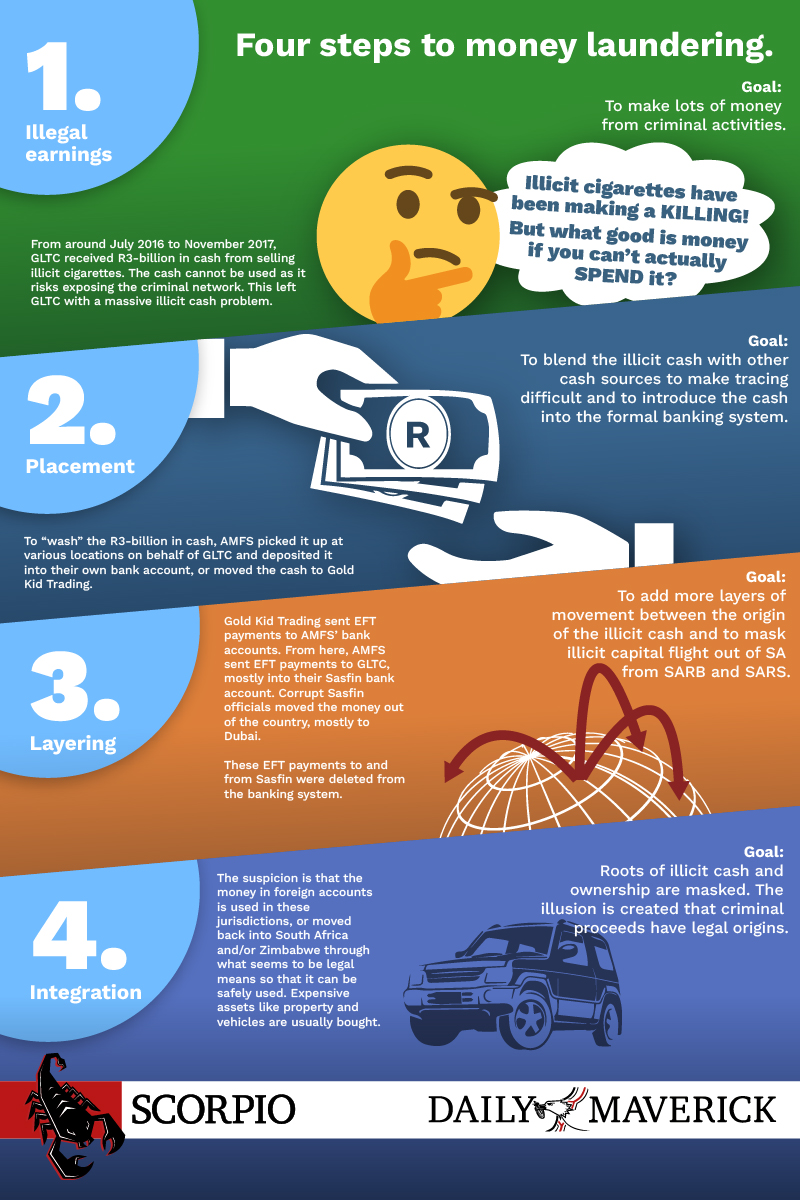
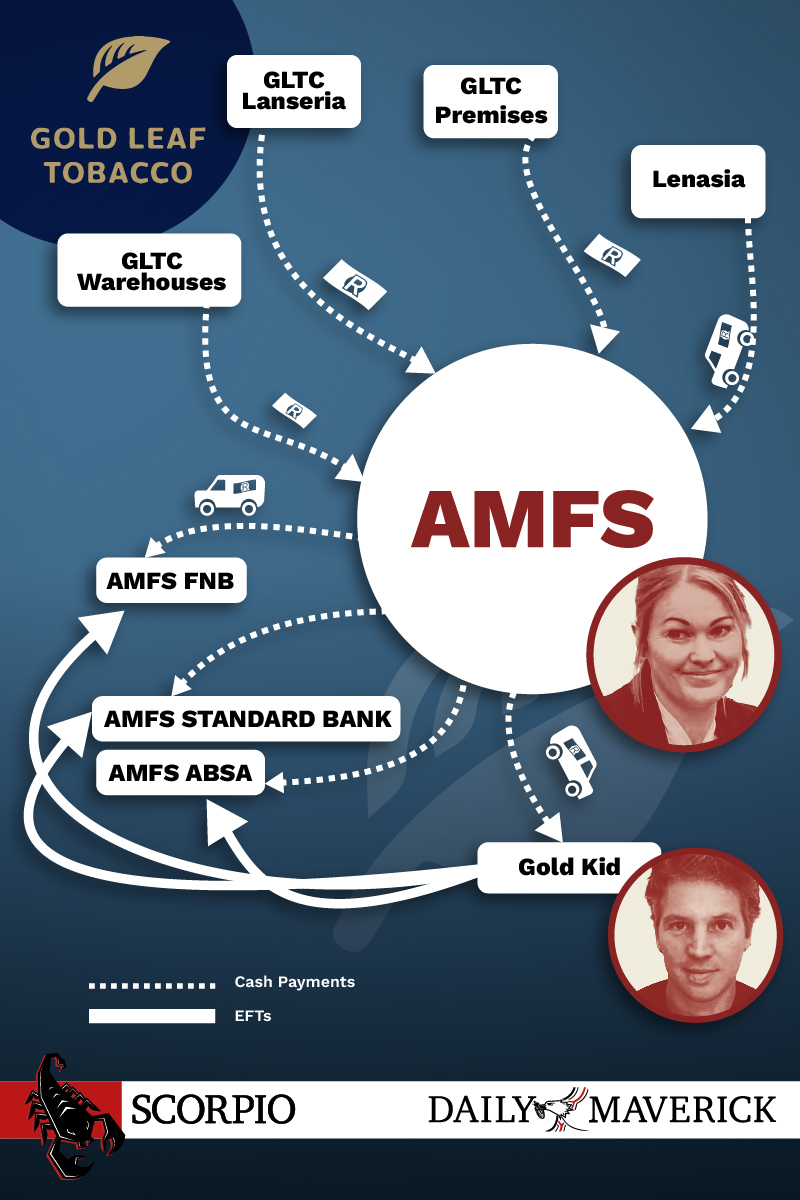
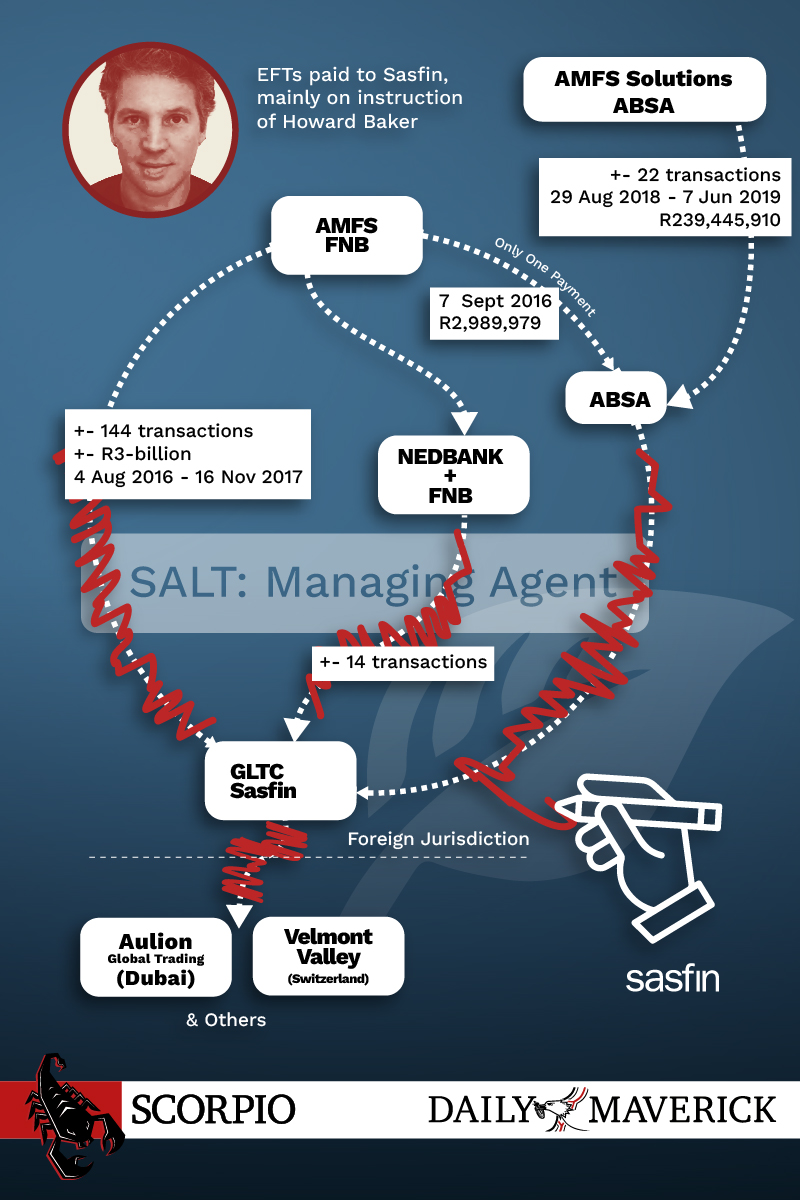
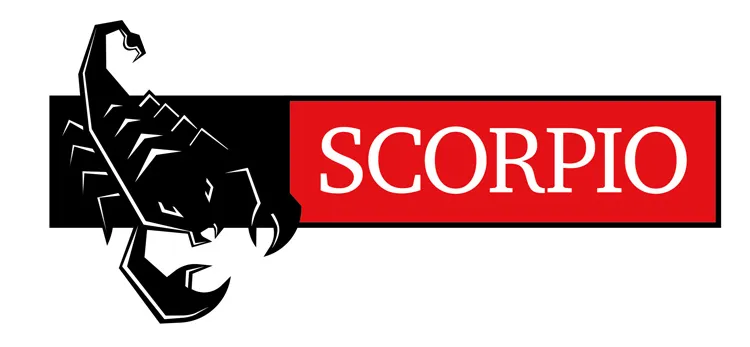


















 Become an Insider
Become an Insider
One hopes that there is investigation into the Minister of Health’s order that ( legitimate) cigarette sales be halted during COVID, thus allowing the sale of illicit cigarettes through informal networks to flourish. One can only imagine the undeclared revenue garnished by GLTC during 2020/1 whilst legitimate sales were halted. Must have been like printing money….
The 20-week sales ban of 2020 was a license to print money for tobacco companies. Research conducted by the Research Unit on the Economics of Excisable Products (REEP) at the University of Cape Town indicates that most smokers were able to purchase cigarettes during that time. The retail prices were sky-high – up to 250% higher than pre-ban prices. Gold Leaf was leading the charge in supplying the market with illicit cigarettes, but all other cigarettes companies were part of this brazen flouting of the (admittedly, very ill-considered) sales ban. If I were the CEO of a tobacco company, I would not be sleeping well right now. If SARS could pull off this investigation on Gold Leaf, they can easily do a similar thing with the other companies.
Hats off to SARS.
“Where there is more money flowing into GLTC than what was declared, they claim to know nothing about it.” Why does that never happen to me? I could do with a few hundred million added to my account without knowing where it came from!
Excellent article. Lets hope that these thieves get long jail sentences!
Best joke of the day – Simon Rudland, a….”buccaneer capitalist”.
Makes him sound quite heroic?
Johnny Depp will be jealous.
Mr Rudland and Mr Adamjee have nothing to fear … because there is a brilliant advocate (in his own mind) called Dali Mpofu who can get them out of any mess … and continue to line his already heavily laden pocket with ill gotten gains, even further !! Don’t worry … be dilly dali !!
This is why I am insider- This is such good journalism. Hopefully, the fiscus can recover the loot.
Two or three rumoured Grand Beneficiaries not mentioned in the above summary?
How did Nkosasana, Winnie and Julius get their cuts? Where does Mazzotti fit in? Did some of the returning Dirty Laundry In Transit find a safe hidey-hole in Cyril’s Couch?
No. That’s the other illicit cigarette company Carnilinx.
Hat off to the SARS investigators to analyze and come up with all the information. Hope the entire network is exposed and charged accordingly. Too often Banks don’t prosecute their own due to reputational risk but fraud on a massive scale exists
Imagine had the one corrupt individual (Rudland) succeeded with taking over a corrupt entity (Tongaat)!!!
The numbers and allegations are for around 2017. Imagine what the totals will look like when updated to 2022! One hopes that our courts can secure the bank records of the offshore accounts where the money went to see where and to whom it was laundered to. And ask those banks about their money-laundering failures.